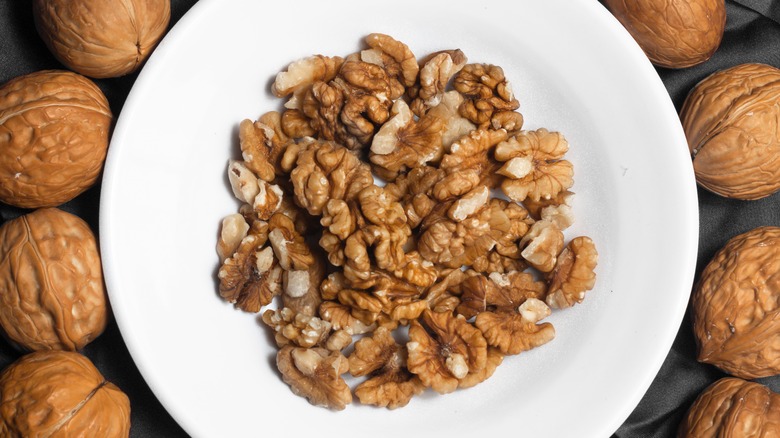The Telltale Sign Your Walnuts Have Gone Bad
Walnuts — and really all other types of nuts, too — can be a little sneaky. While they're technically fruits, they're not sold in the produce department of your grocery store, where they would be refrigerated and misted to preserve the fleeting freshness required to enjoy them. Unlike something like meat or dairy, they seem more like a pantry staple you can store at room temperature for months on end. The bad news is that nuts do in fact have a shelf life, and when that clock runs out, you're left with seriously subpar nuts. The good news is that with a little know-how and proper storage methods, you can prolong their delicious peak freshness.
Walnuts in particular can really turn on you after a few months because they have a higher fat content than some other types. To determine if your walnuts have spoiled, first take a look at their color — if it's darker, they might have started to go bad. They'll also shrink, because drying out is part of their spoiling. In terms of smell, you might pick up on an oily odor if they're off. And if you make it as far as taste, bad walnuts are softer, less crunchy and less short in their bite, less walnutty in flavor and more neutral and flour-like, and possibly bitter or sour. Even if you don't pick up on a rancid sour note, older walnuts not properly stored are too dry and bland to make for a good snack or recipe addition.
How long walnuts last and how to store them
How you store your walnuts greatly affects how long they last. Walnuts are harvested in the fall, so if you get them then, you have especially fresh nuts with more life in them. Walnuts still in their shell last longer, and in general, it's a good idea to hold off on any chopping, roasting, toasting, etc. until right before you're going to use them.
Walnuts in their shell can last up to a year at room temperature, shelled walnuts up to three — but only if you keep them in a sealed, airtight container. They shouldn't have any exposure to light, and they shouldn't ever be allowed to get too warm. No matter where you store your walnuts, exposure to air and moisture can introduce bacteria and heat can encourage its growth. Colder storage is best because of this. In the refrigerator, shelled nuts should be good for around six months, and that goes up to a year or longer in the freezer.
If your walnuts are simply a bit dry, you can bring back some of their flavor and crunch by toasting them in the oven or on the stove. It's only when they really start to shrink, smell oily, and taste floury or even bitter that they're past saving. To avoid having walnuts left to go bad, enjoy them in all kinds of recipes, from maple walnut muffins to walnut broccoli stir-fry.

